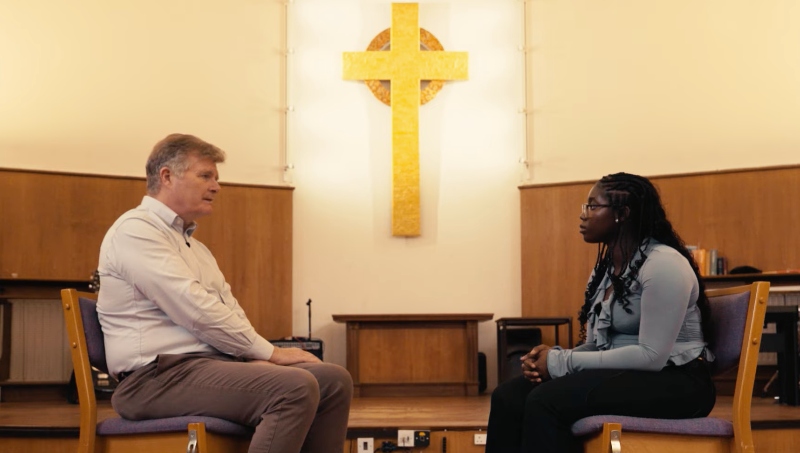The Future of Arms: blockbuster films or the new reality of war?
New technologies are changing the way in which war is fought. Advances in artificial intelligence and space technology are opening up new domains of conflict raising new questions of ethics.
A new project called Future of Arms from the Joint Public Issues Team aims to equip Christians and our churches to engage in discussion and advocacy with decision-makers about these issues, as we seek to fulfill the Christian vocation to be peacemakers.
Sienna Sexton explains more
When I was growing up, my Dad believed that it was his duty as our father to ensure that my brother and I received a robust and culturally rich education. That is to say, he made sure that we were brought up watching the Star Wars films. This meant that Luke Skywalker, Yoda and Jaja Binks were some of my childhood heroes. My brother and I could be found in our back garden engaged in fierce, intergalactic combat, sparring with toy lightsabers.
For many of us, the words ‘star wars’ mean nostalgic films, centred around loveable characters on feel good adventures. Films in which, against all the odds, our heroes reliably succeed in restoring the balance of good versus evil in the universe.
Today however, ‘star wars’ or ‘drone wars’ are not just the stuff of movies, but are the new frontier of warfare as a result of technological advancement and rising conflict between superpowers.
While in the UK we live in relative peace, the state of conflict globally is high. You can’t open a newspaper or any form of social media without seeing heart-breaking news of the wars in Gaza and Ukraine.
While these are the conflicts that we are most aware of, the tragic reality is that these aren’t the only wars happening currently. Indeed, according to analysis by the NGO ACLED (Armed Conflict Location and Event Data) in July 2024
one in seven people in the world have been exposed to conflict in 2024, and 50 countries are facing extreme, high or turbulent levels of conflict.
This marks an increase in the level of conflict globally. It’s not just that people around the world are facing more political and climate instability in addition to more armed conflict; we are seeing heightened tensions between the global superpowers of the US, Russia and China.
This climate of fear and tension is driving countries around the world to increase military spending and arms production, and consensus around arms control and international law is being lost. In 2023 global military spending leapt up
by 6.9 per cent to $2443 billion, at the same time as international development aid consistently failed to meet the increasing humanitarian need.
From a humanitarian perspective there is an overwhelming interest in working to end conflict, in redirecting spending on war to humanitarian issues, and rebuilding global political will around arms control and international law.
However, there is very little desire from key international players to do this, which is particularly concerning as technology is pushing war into uncharted territories. War in space, conflict played out on the web and the use of killer robots are not the stuff of science-fiction any more. The technology already exists and in some cases is already being used in conflicts around the world. International law is lagging behind these advancements.
This means that, as people who care about working for global peace, tackling climate change, and reducing global poverty, we need to confront these new ethical questions, and challenges. With countries stocking up on weapons, we need people like you and me to speak up on these issues.
Throughout history the church has consistently played an important role in advocating for peace, in speaking up for the sanctity of life, in promoting arms control, shaping human rights and international law.
We believe that Christians and the church have a role to play again. We must be a part of the dialogue around these new and complex ethical questions, to look for peaceful solutions, and to work with our politicians to ensure that the UK works for a future where technology is used for the good of humanity.
This is why JPIT is launching
the Future of Arms project. The project comprises a series of educational resources: briefings, blogs, podcasts, webinars and videos.
You can learn about these important issues and find out how you and your church can be part of working towards a more peaceful future, where technology is used not to take life, but to improve and even save it.
To borrow some of the wisdom from Yoda, “to be Jedi is to face the truth, and choose. Give off light, or darkness, Padawan. Be a candle, or the night.” In a world where there are immense challenges, it is easy to feel powerless and to give into fear, but let’s choose to be light, to work together to be lights in the darkness.
Join us as we seek to use our influence and our voices to create a more peaceful future. Find more at jpit.uk/futureofarms
The introductory video was filmed at Spurgeon's College, and featured an interview with Principal Professor Philip McCormack, a former army chaplain, in which he discussed a Christian response to these issues.
It can be accessed here

Sienna Sexton is a former intern with the Joint Public Issues Team
Do you have a view? Share your thoughts via our letters' page.
Baptist Times, 05/12/2024